Index
This topic area covers statistics and information relating to gambling undertaken among adults in Hull including local strategic need and service provision. Gambling behaviour information has been collected within Hull’s Health and Wellbeing Surveys and full reports are available under Surveys within Tools and Resources.
Headlines
- The societal costs of problem gambling were estimated at least £1.27 billion in 2019/20 in England.
- All residents in Hull are within an eight minute drive of their nearest gambling outlet (and virtually all residents are within a 3-4 minute drive) which gives an indication of the density of gambling outlets in Hull. However, with an increased presence of online gambling, this makes gambling even more accessible.
- Gambling related harm affects far more people than just the problem gambler. Some estimates suggest that for every problem gambler, between 6 and 10 additional people (such as friends, family, co-workers) are directly affected. Furthermore, problem gambling is often present with other issues such as poor mental health, social isolation, housing problems and debt.
- In a local survey, two-thirds of adults in Hull gambled with around 44% gambling every month including almost three in ten who gamble every week.
- People who did gamble were asked how frequently they had lied to people important to them about how much they had gambled, felt the need to bet more and more money, and bet more than they could afford to lose. One in a hundred survey responders had undertaken one or more of these three problem gambling behaviours weekly (equating to 1,950 adults across Hull), and a further 0.6% undertook one or more of these behaviours monthly (1,200 adults).
- Men aged 16-24 years were the least likely to gamble monthly (34.0%), but they had the highest percentage of them who displayed problem behaviours (4.3% of all men aged 16-24 years which was 9.7% of all those who gambled monthly). Similarly, of those who did gamble monthly, people who were not working due to long-term illness and disability also had a relatively high percentage who displayed problem gambling behaviours weekly or monthly with 8.4% doing so. The percentage was also above 7% for men aged 25-44 years.
- A Gambling Harms Needs Assessment was conducted in Hull in 2019 with an update in 2024.
The Population Affected – Why Is It Important?
From the Cards on the Table report in 2016, it is estimated that the societal costs of problem gambling were between £210 million and £560 million in 2016. However, the Department of Health and Social Care commissioned Public Health England (at the time – now the Office for Health Improvement & Disparities) to undertake a review of the evidence on gambling harms, and the harms associated with gambling were estimated to be at least £1.27 billion in 2019 to 2020 in England alone. The analysis included for the first time an estimate of the economic cost of suicide (£619.2 million) and provides an updated cost of homelessness associated with harmful gambling (£62.8 million).
The 2021 Health Survey for England half of people had participated in gambling activity in the last year (55% of men and 45% of women), although this fell to 36% once the National Lottery was excluded (39% of men and 33% of women), and fell further to 18% if scratchcards were excluded (23% of men and 13% of women). One in ten had participated in online gambling (excluding the National Lottery) in the last year (14% of men and 5% of women). People aged 45-54 years were the most likely to have gambled in the last year (61%) whereas those aged 16-34 years (39%) were the least likely to have gambled. However, this was generally associated with the National Lottery and/or scratchcards, and the youngest age groups were the most likely to have gambled once lotteries and scratchcards were not included (22% for 16-34s, 30% 45-54s and 7% for 75+ years) and gambled online excluding National Lottery (14% for 16-34s, 11% for 45-54s and 1% for 75+ years).
From the Cards on the Table 2016 report, it was estimated there were 373,000 problem gamblers, and 1.7 million at risk of problem gambling in England. Furthermore, as an Out of Luck Citizen’s Advice report states “Gambling related harm affects far more people than just the problem gambler. Some estimates suggest that for every problem gambler, between 6 and 10 additional people (such as friends, family, co-workers) are directly affected.”
In Public Health England’s 2021 report on gambling harms, it was found that there were strong associations between gambling harms and geographical areas of high deprivation such as the North of England, who may already be experiencing greater health inequalities. The review found a clear link between alcohol consumption and harmful gambling with 35% of non-drinkers participating in gambling compared to 74% of those who drank 50+ units of alcohol per week. Alcohol use in children and young people was also found to be a risk factor for subsequent harmful gambling. The review also highlighted the link between gambling and mental health issues. Evidence also suggests that people with gambling problems are at least twice as likely to die from suicide compared to the general population with one overseas study showing that people with a gambling disorder had a 19 times increased risk of dying from suicide.
A report published in March 2022 by the Commission on Crime and Gambling Related Harms explored the experiences of people directly affected by gambling and crime, and found that there was relatively low levels of understanding and support available within the criminal justice system regarding the effects of gambling. Furthermore, the report stated that many people who commit crime as a result of gambling addition or harms have experienced Proceeds of Crime Act (2002) proceedings. However, given the nature of gambling additional as a mental health disorder, and the lack of material benefit arising from gambling related crime, the report stated that this seemed paradoxical to the original purpose of the Proceeds of Crime Act which is to confiscate proceeds where people have benefitted from their crimes. Proceeds of Crime Act was an additional significant stressor on people in prison and particularly for families who lived with them. Even after the sentence was completed, Proceeds of Crime Act still remained a stressor for people and hindered future progress, recovery and rehabiliation.
The Hull Picture
Density of Gambling Outlets
The Access to Healthy Assets and Hazards which includes drive times to nearest gambling outlet was updated in 2024.
The Access to Healthy Assets and Hazards (AHAH) index is designed to allow policy and decision makers to understand which areas have poor environments for health, and to help move away from treating features of the environment in isolation.
The Access to Healthy Assets and Hazards index is comprised of four domains: access to retail services (fast food outlets, gambling outlets, pubs/bars/nightclubs, off licences, tobacconists), access to health services (GP surgeries, A&E hospitals, pharmacies, dentists and leisure centres), the physical environment (green and blue spaces) and levels of air pollution (nitrogen dioxide (NO2), particulate matter smaller than 10 microns (PM10) and sulphur dioxide (SO2)).
In 2024, the Access to Healthy Assets and Hazards Index is very high in Hull with 44.7% of Hull’s population residing in the bottom fifth of areas nationally in relation to the Access to Healthy Assets and Hazards Index. The percentage nationally is 20.9% and across the other 14 lower tier local authorities in the region the range is from 1.3% to 32.6%.
Compared with benchmark
| Indicator | Period | England | Yorkshire and the Humber region (statistical) | Kingston upon Hull | East Riding of Yorkshire | North East Lincolnshire | North Lincolnshire | York | North Yorkshire UA | Barnsley | Doncaster | Rotherham | Sheffield | Bradford | Calderdale | Kirklees | Leeds | Wakefield |
|---|---|---|---|---|---|---|---|---|---|---|---|---|---|---|---|---|---|---|
Access to Healthy Assets & Hazards Index (Persons All ages) | 2024 | 20.9 | 18.2 | 44.7 | 9.4 | 23.6 | 10.7 | 1.3 | 13.4 | 10.2 | 6.2 | 9.7 | 13.7 | 32.6 | 5.1 | 13.1 | 30.3 | 18.8 |
| Indicator | Period | England | Yorkshire and the Humber region (statistical) | Kingston upon Hull | East Riding of Yorkshire | North East Lincolnshire | North Lincolnshire | York | North Yorkshire UA | Barnsley | Doncaster | Rotherham | Sheffield | Bradford | Calderdale | Kirklees | Leeds | Wakefield |
|---|---|---|---|---|---|---|---|---|---|---|---|---|---|---|---|---|---|---|
Access to Healthy Assets & Hazards Index (Persons All ages) | 2024 | 20.9 | 18.2 | 44.7 | 9.4 | 23.6 | 10.7 | 1.3 | 13.4 | 10.2 | 6.2 | 9.7 | 13.7 | 32.6 | 5.1 | 13.1 | 30.3 | 18.8 |
Despite the very high levels in Hull, the index has decreased considerably since 2016 when nine in ten residents lived in the worst fifth of areas of England in relation to the index, although there was a large decrease between 2016 and 2017 to 46% with only relatively minor changes to 2022 and 2023.
In 2024, it is estimated that 120,220 residents in Hull live within areas defined as the bottom fifth of areas nationally based on the Access to Healthy Assets and Hazards Index.
Compared with benchmark
Access to Healthy Assets & Hazards Index (Persons All ages)
|
Period
|
Kingston upon Hull |
Yorkshire and the Humber region (statistical)
|
England
|
||||
|---|---|---|---|---|---|---|---|
|
Count
|
Value
|
95%
Lower CI |
95%
Upper CI |
||||
| 2016 | • | 233157 | 90.0% | - | - | 22.2% | 21.2% |
| 2017 | • | 120814 | 46.3% | - | - | 14.1% | 21.1% |
| 2022 | • | 114694 | 44.3% | - | - | 19.9% | 22.6% |
| 2024 | • | 120220 | 44.7% | - | - | 18.2% | 20.9% |
Source: Consumer Data Research Centre
Information relating to version 4 of the Access to Healthy Assets and Hazards index is available at lower layer super output area geographical level. There are 33,755 lower layer super output areas in England, and the percentile score has been calculated for each of the 168 lower layer super output areas in Hull. The index was updated in July 2024, and information on the individual components is available.
The drive times to the nearest gambling outlet are low in Hull. Whilst not everyone in a city will have access to a car or van (35% of households in Hull compared to 23% of households in England), the map does illustrate the density of gambling outlets in Hull, and many people will likely be a relatively short walk away from their nearest gambling outlet. Furthermore, there is an increased presence of online gambling which makes gambling even easier to access.
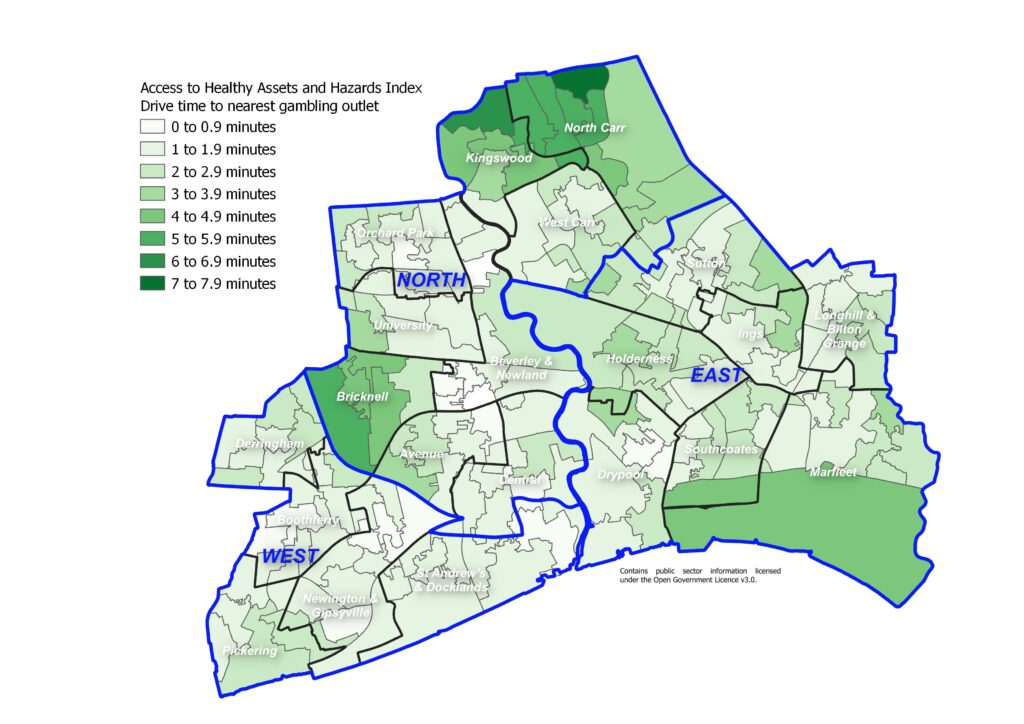
Information on the other indicators is available under Geographical Area under Place.
Prevalence of Gambling
From the local Health and Wellbeing Survey 2019, it was found that playing the lottery and scratch cards were the most common types of gambling with 49% of adults playing the lottery and 36% using scratch cards. Two-thirds of adults took part in some form of gambling (65%) equivalent to more than 136,000 people in Hull, with 44% (almost 92,000 people) gambling every month. People aged 16-24 years were the least likely to gamble, and there was relatively small differences in the percentages who gambled every month by local deprivation fifth.
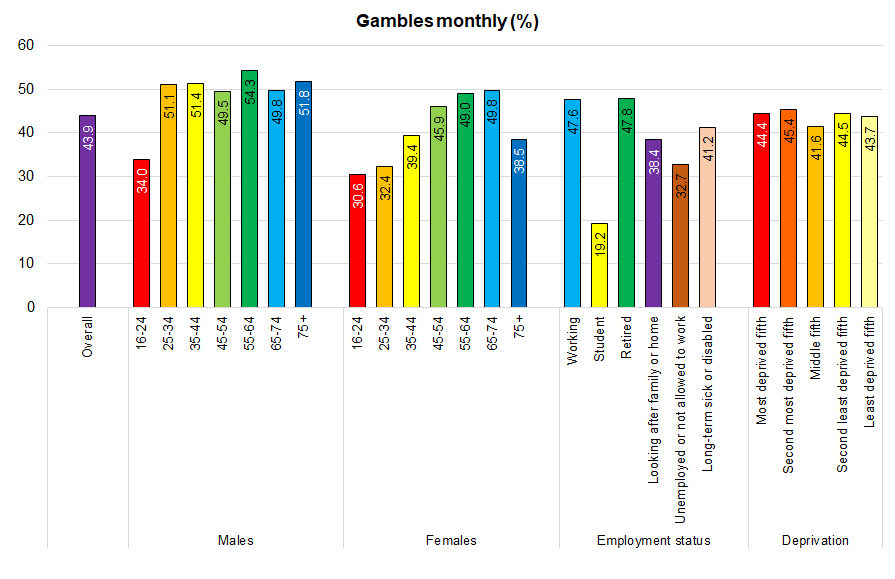
People living in Sutton were the most likely to gamble every month with 56% doing so, and in Derringham over half of the adults gambled every month (51%). In contrast, residents of Beverley & Newland and Drypool wards were the least likely to gamble monthly with just over one-third doing so.
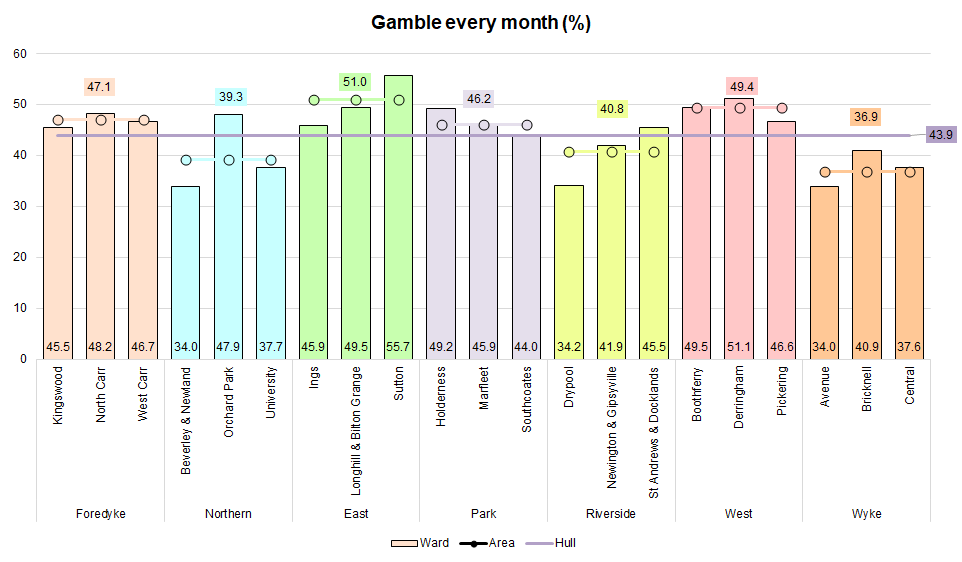
Almost three in ten gamble every week, one in ten men (equivalent to 35,400 men across Hull) and one in four women (equivalent to 26,800 women across Hull) increasing with age and peaking at age 55-64 years (41%). At 38%, the retired were the most likely to gamble each week, as were those with no dependent children at home.
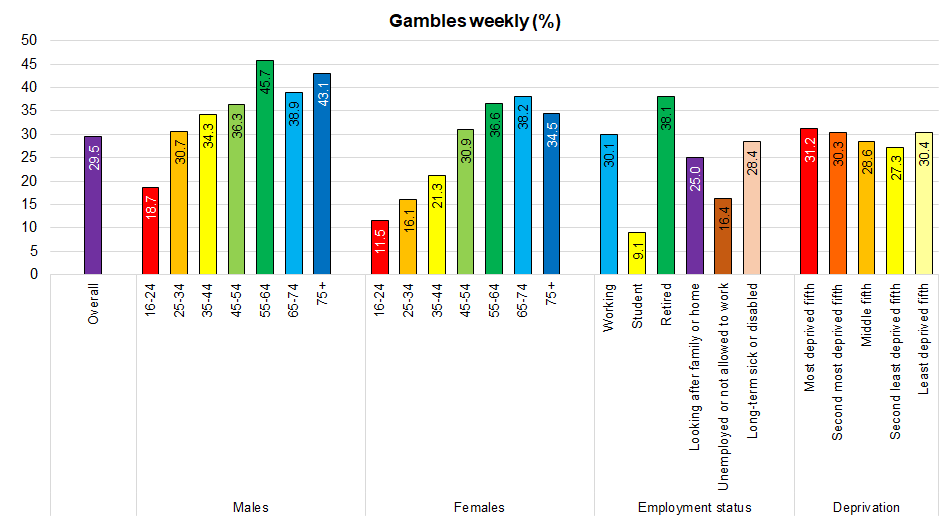
Weekly gambling prevalence varied by Area Committee Area (from 23% in Wyke to 37% in East), but there was little variation by deprivation. More than a third of people living in Sutton (41%), Pickering (35%), Longhill & Bilton Grange (34%), Ings (34%), West Carr (34%) and Holderness (34%) gambled every week.
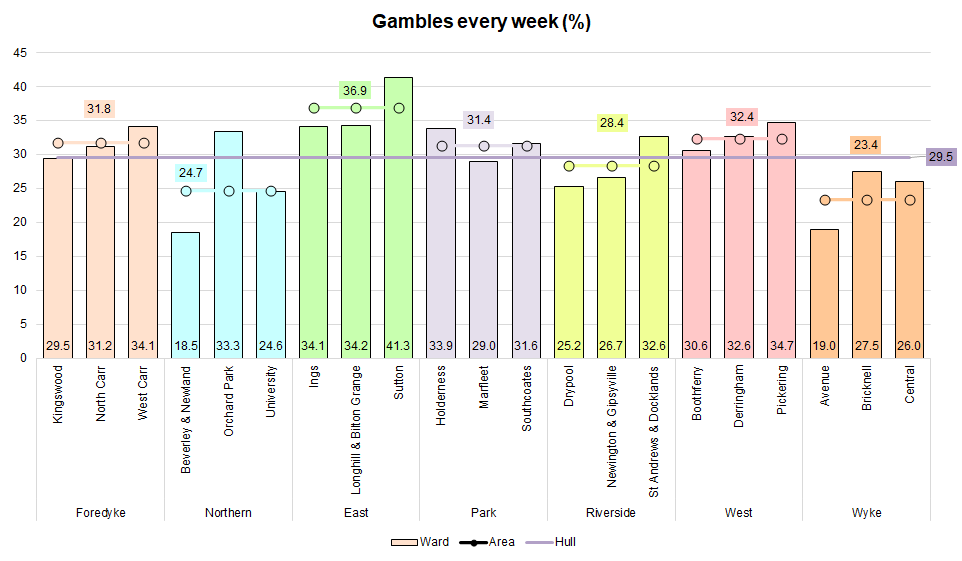
Overall, 4.3% of survey responders gambled most days. Whilst fewer men aged 16-24 years gambled every week, among those that did they were more likely to gamble most days (around one-third of the weekly gamblers). There was also a strong association with deprivation with people living in the most deprived fifth of areas of Hull more than twice as likely to gamble most days compared to those living in the least deprived fifth of areas of Hull. People who were not working due to long-term illness or disability also had a relatively high percentage who gambled every day. Whilst there had been relatively small differences in the percentages of people who gambled monthly or weekly by household composition, when examining the percentage of people who gambled most days, people living in a household with three or more adults who lived with children aged under 18 year were twice as likely to gamble most days compared to survey responders from other households.
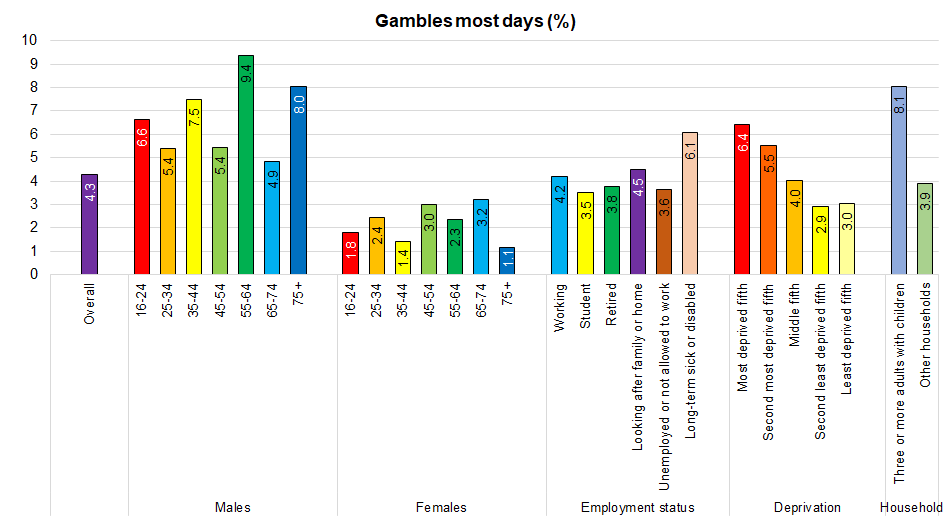
The prevalence of gambling on most days was low, but there were considerable differences across the electoral wards. Around 7% of more of people in Newington & Gipsyville (7.6%), Orchard Park (7.3%), Longhill & Bilton Grange (6.8%) and St Andrew’s & Docklands (6.6%) gambled most days.
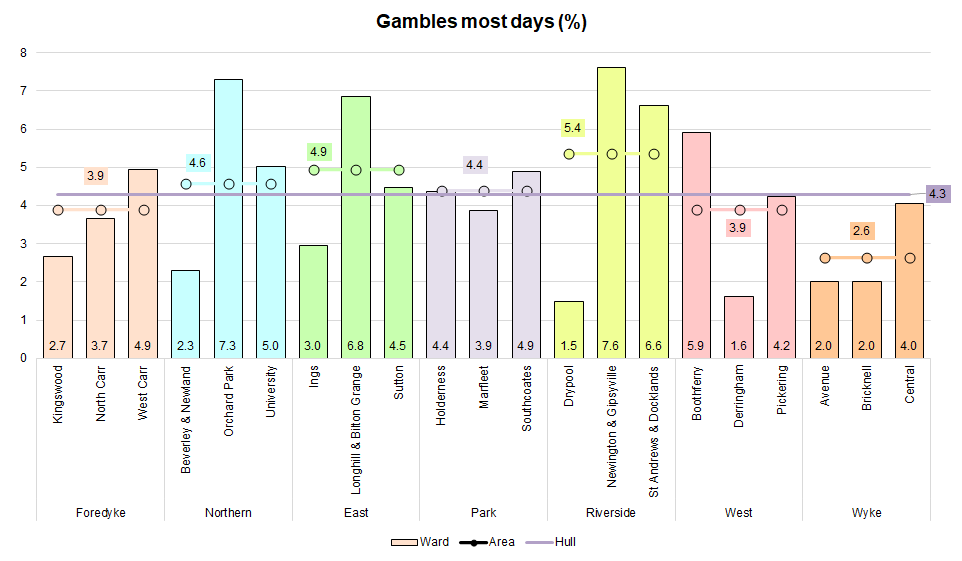
There were 175 people who stated that they gambled most days with between 165 and 169 giving details of the frequency of different types of gambling. Among those who gambled most days, 28% played scratchcards most days, 44% did the lottery most days, 38% bet on the results of sports matches or racing most days, 12% bet on casino or card games most days, 12% played on fruit machines most days, 8% on fixed odds betting terminals most days and 8% played bingo most days.
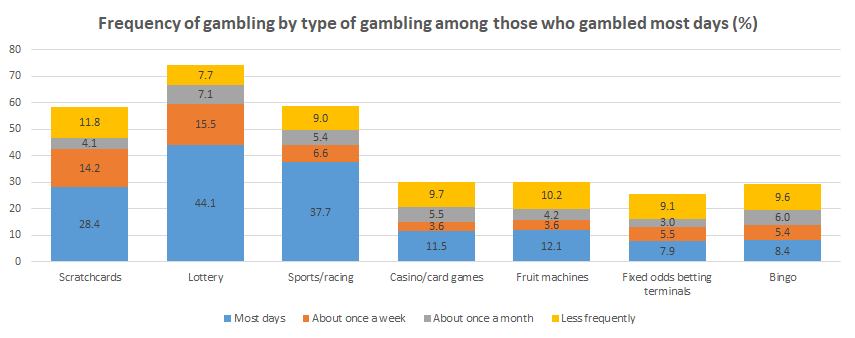
People who did gamble were asked how frequently they had lied to people important to them about how much they had gambled, felt the need to bet more and more money, and bet more than they could afford to lose. People who stated they had done one or more of these monthly were classified as potential problem gamblers.
Overall, 2.5% had lied to people important to them about how much they had gambled in the last year (equating to 5,150 adults across Hull) with 0.9% having done so either weekly or monthly (equating to 1,950 adults). Overall, 3.2% had felt the need to bet more and more money in the last year (6,750 adults across Hull) with 1.2% doing so weekly or monthly (2,550 adults across Hull). Furthermore, 2.5% had bet more than they could afford to lose in the last year (equating to 5,250 adults) with 1.0% having done this weekly or monthly (2,100 adults). People who stated they had done one or more of these monthly were classified as potential problem gamblers.
Just under one in a hundred (0.9%) had undertake one or more of these problem gambling behaviours weekly (equating to 1,950 adults across Hull), 0.6% undertake one or more of these behaviours monthly (1,200 adults), 1.5% do this ‘a few times a year’ (3,100 adults), 1.2% have done this ‘once or twice in the last year’ (2,550 adults), 1.2% have done so but not in the last year (2,400 adults), 0.9% not in the last five years (1,900 adults) and 93.7% have never done any of these three gambling behaviours (equating to 195,750 adults).
Men aged 16-24 years were the most likely to undertake one or more problem gambling behaviours with 4.3% doing so weekly or monthly. More than 2% of all men aged 25-44 years, women aged 45-54 years, students, unemployed, not working due to long-term illness and disability, and who lived in the most deprived fifth of areas of Hull also displayed one or more of these problem gambling behaviours weekly or monthly.
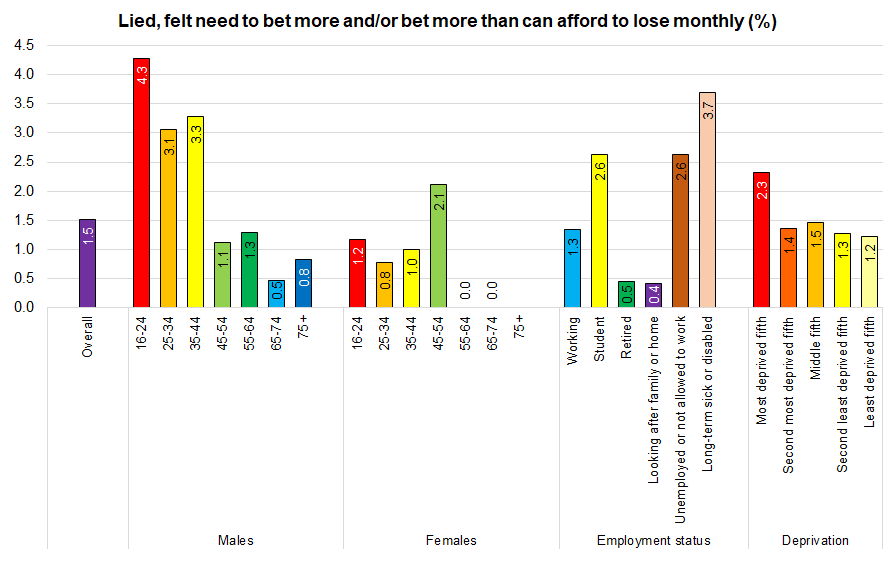
People living in St Andrew’s & Docklands ward were the most likely to display one or more of the problem gambling behaviours weekly or monthly with 4.5% of all residents doing so. The percentage in Boothferry was also relatively high at 3.5%.
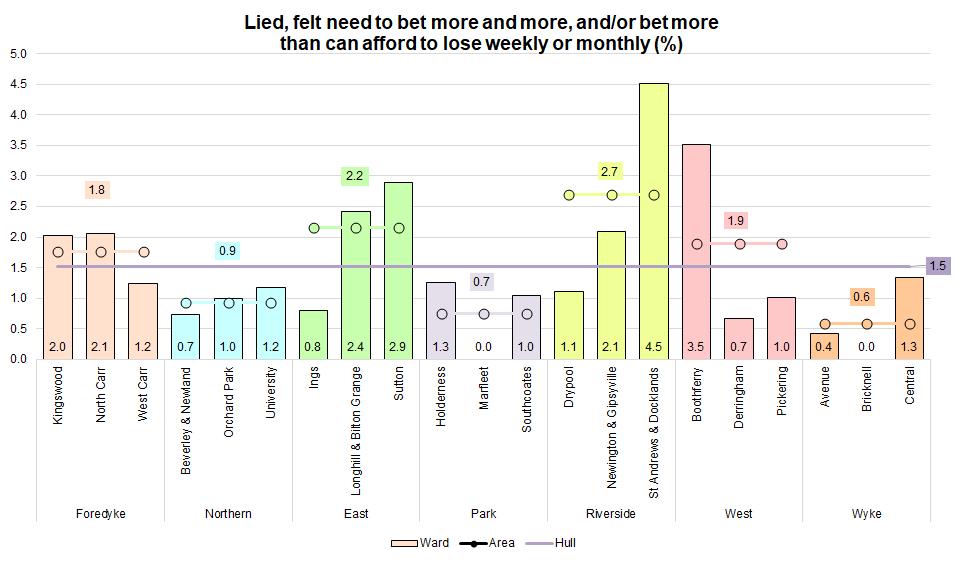
Men aged 16-24 years were the least likely to gamble monthly, but they had the highest percentage of them who displayed problem behaviours (4.3% of the 34.0% who gambled which is 9.7% of all monthly gamblers). Similarly, of those who did gamble monthly, people who were not working due to long-term illness and disability also had a relatively high percentage who displayed problem gambling behaviours weekly or monthly with 8.4% doing so.
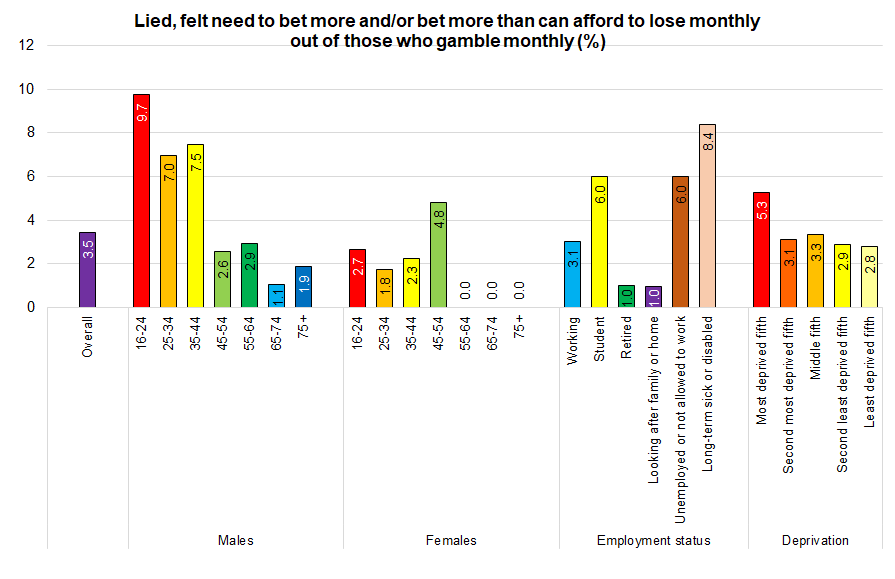
There were 55 survey responders who had lied, felt the need to bet more and more and/or bet more than they could afford to lose at least monthly. Among these 55 potential problem gamblers, 17% played scratchcards most days, 16% did the lottery most days, 24% bet on the results of sports matches or racing most days, 17% bet on casino or card games most days, 25% played on fruit machines most days, 14% on fixed odds betting terminals most days and 10% played bingo most days.
Almost a half of those who had lied, felt the need to bet more and more and/or bet more than they could afford to lose at least monthly bet on the results of sports matches or racing most days or about once a week, the next most common type of gambling among those group undertaken weekly or more frequently was playing scratchcards (40%), lottery (36%), fruit machines (34%), betting on casino or card games (31%) and playing on fixed odds betting terminals (30%) with the playing bingo the least likely weekly activity among this group (24%).
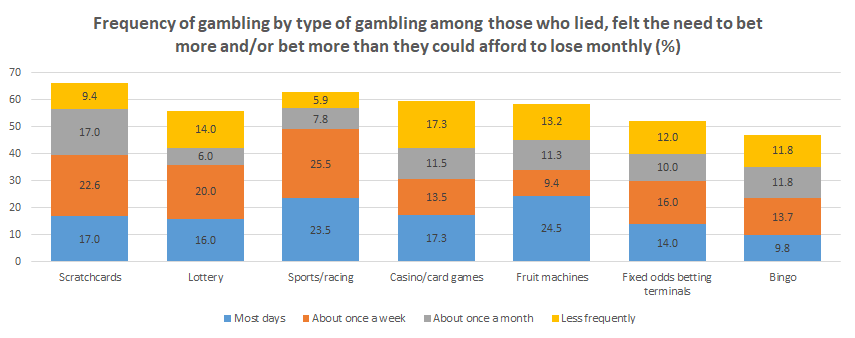
The frequency of undertaking different types of gambling was very similar among the 34 people who had lied, felt the need to bet more and more and/or bet more than they could afford to lose at least weekly with the most common type of gambling being betting on sports matches or racing, playing scratchcards and playing on fruit machines.
Strategic Need and Service Provision
Some information relating to gambling behaviours and potentially harmful gambling behaviours has been collected in Hull to give an indication of the prevalence of gambling and gambling harm in Hull. However, information is generally relatively limited and this makes assessing and dealing with problem gambling difficult.
With two-thirds of adults gambling, and almost one third doing so each week, the potential for gambling-related harm is high. The actual level of gambling-related harm is unknown for Hull. However, it is estimated that more than 14,000 adults in Hull have experienced some problems related to gambling including 8,800 adults who state they have undertaken some of these problem gambling behaviours within the last year (including 3,150 adults who have stated that this happens weekly or monthly).
A Gambling Harms Needs Assessment was completed in Hull in 2019, and had a rapid refresh in 2024 – available in the resources section on this page – with the following noted:
- It recognised that Hull City Council as a licensing authority has a statutory role in the licensing and regulation of gambling premises. It also has a duty to promote the health and wellbeing of the population.
- Many people chose to gamble, but staff in services in Hull have observed an increase in problem gambling amongst women, largely linked to online gambling with online bingo the most frequently cited form of gambling amongst women accessing services in Hull.
- Gambling harms are likely to widen inequalities between communities in Hull and between Hull and less deprived localities. This is because problem gambling and gambling related harms are associated with social deprivation. Hull is the fourth most deprived local authority in England.
- There is no routinely locally collected data to inform a local response. National prevalence data is considered to be a conservative estimate of problem gambling prevalence not capturing data amongst all vulnerable groups. Hull is highly unlikely to have lower than average levels of problem gambling prevalence. We do not know the extent or cost of gambling related harms in Hull but there is clear evidence of their existence and examples of their impact on individuals, families and services.
- A growing appreciation of the harms associated with gambling is evident in national policy, with advocacy for a multi-agency approach across services to prevent and minimise harms. There are clear calls for a change in emphasis away from individualised responsible gambling behaviour to a wider recognition of the impact of gambling on families and communities and the promotion and availability of gambling products in our communities.
- Hull is estimated to have between 645 and 3,871 problem gambling adults (16+), depending on the problem gambling prevalence rates we apply to our population.
- Nationally problem gambling prevalence amongst young people is considered to be rising, from 0.4% in 2016, to 1.7% in 2018. Hull may have 233 Problem Gambling 11-15 year olds (applying national prevalence estimates to young people aged 11-15 in Hull). Our 2024 Children and Young People Survey asked questions of our 11-16 pupils on gambling activities. This page will be updated with the findings later this year.
- Local services exist (industry funded) to support people affected by problem gambling but referral pathways and availability are not well understood amongst frontline services.
- It was recommended that there should be training of frontline service staff, increased awareness raising for gambling harms among children and young people, further data collection and screening to measure problem gambling for both adults and young people, increased awareness of local treatment services, and assure compliance with safeguarding responsibilities with gambling operators.
Resources
Hull’s Health and Wellbeing Survey 2019
Health Survey for England: NHS Digital: https://digital.nhs.uk/data-and-information/publications/statistical/health-survey-for-england
Public Health England. Landmark report reveals harms associated with gambling estimated to cost society at least £1.27 billion per year. Public Health England, 2021. https://www.gov.uk/government/news/landmark-report-reveals-harms-associated-with-gambling-estimated-to-cost-society-at-least-1-27-billion-a-year
Smith L. Commission on Crime and Gambling Related Harms. Surviving, not living: lived experiences of crime and gambling. University of Lincoln, 2022. https://howardleague.org/wp-content/uploads/2022/03/Lived-Experiences-report-FINAL-2.pdf
Updates
This page was last updated / checked on 24 April 2025.
This page is due to be updated / checked in February 2026.